Nowadays, with the availability of Internet at almost everywhere, more people choose to read online newspaper other than spending a penny cent to buy a printed version of it. Why is it so?
The number of mobile devices users has increased rapidly since the year 2000. Now almost everyone has their smart phone or tablet such as IPad and some might have both. And again it has ease them to access information as all needed is just a click. Now with software in phone such as the play store for Android user, it is more convenience for the smart phone user to download apps of news that they prefer and just read news online.
A finding by the Newspaper Association of America (NAA) has shown that women contribute the highest number of online news audience as compare to the opposite sex which is men. Women in the rank of age which is 25 to 34 prefer to read online news through their phone other than other device. The number of these group of people has double since last year which is the year 2014 and this positive growth of mobile users to access online news follow by group of men in the age between 34 and 44. Hence, the number of newspaper digital audience is higher than those who prefer to read printed newspaper. And most of the newspaper digital audience access the portal through their smart phone than using other devices such as laptop, desktop or the combination of all three. This is the case because phone is more convenience to be carry around other than other digital devices as the size is smaller and lighter while other like laptop is bigger in size.
What happen to the traditional printed newspaper?
Newspaper are produce dues to the demand of the reader. If the number of reader decrease, the quantity of newspaper produce daily also tend to be going down.

Hence few newspaper company decide to increase the production in term of quantity and topics in both digital and printed version of newspaper on the weekends to gain more profit.
The State of News Media has listed worldwide Top Ten of digital newspapers that has highest number of readers in 2012. The first three is Mail online with 50,067 000 of audience, follow by The New York Times Brand with 48,695 of audience and The Guardian which has 38,931 000 readers. This has affect the journalism industry of traditional printed newspaper. The number of workforce in the newspapers company is at peaked where the number reach 56,900 in the year 1989. However, in 2012 the number of workforce in the newsroom has fall below 40,000. This might cause by the decline in number of readers for printed newspaper that has make the newspaper company to cut off the number of excessive worker. Other than that, now people rarely used newspapers to publicise their product as the payment for the advert segment is higher as compare to advertisement in online news portal. This has cause less profit for the newspaper company.
What constitute good and bad in online news?
Online news media is an independent form of media whereby it does not belong to any corporate group. Hence it is free from news based on business, money or political interest of certain corporate group as there is no status quo in term of ownership for online news media. Alternative media on the other hand focus more on gaining profit other than providing accountable news for the readers and they tend highlight event that not even there. Yet although online news media is independent, it does not guarantee that online news media is free from bias. By being independent it means that one has power to choose and highlight news topic to his or her interest. However non-corporate news media with smaller number of sources and audience than the CBC’s tend to correct mainstream news media by critique the way of writing or words used upon the news report. As stated by Beers (2006)
Still other independent news sources may exist to speak to sub cultures whose members share certain assumption or values, and so their news and opinion pieces begin with a biased set of concerns tailored to that audience. And some online news sources are forums where anyone can post stories or pictures or discuss what others have posted; thus bias is not located in any conscious editorial decision making authority (p. 116).
Hence through internet, news has become more interactive and no more just limited to one way of delivering information as people can comment and interact in the online news media. Besides that the interactive relationship is not only limited to national level but it happens globally between people from different part of world.
There are two types of internet independent media which is E-zine news media and the blogosphere. E-zine news media is still based on traditional type of journalism whereby the staff editors create news content by providing the latest news about the world and do deep analysis about certain topic before publish it. This practise has enhance their credibility as one of accountable online news media. Example of E-zine news media is The Tyee (http://thetyee.ca/), Rabble which is from Canada (http://rabble.ca/), and Open Democracy in United Kingdom (https://www.opendemocracy.net/).
Next is the blogosphere, a blog or web blog which is an electronic notebook and is own and updated individual. Blog is usually written to express personal life, to share interest with others, more about holiday destination, pets and now people are using blog to do online business. Only a small number of people are using blog to post up about news and analysis on recent news topic. However, most of the blog writer is not a journalist or even went to journalist school to have such credibility as a journalist does. As mention by Westheimer and Kahne (2004) “They are electronic pamphleteers, self-appointed editor/commentators who use their own highly selective filter to note, deconstruct, annotate, and re-spin news items produced elsewhere” (p. 240). Yet the advantage of blog writing is that it allowed people to comment and give back regarding topic that was written on the blog.
Current issue on GST (Good and Service Tax).
We have choose one current mainstream topic and our news story will be on GST (Good and Service Tax) that had emerge in online news, blog, broadcast media, social media and printed media (newspaper).
Comparison in online news and Blog.
Reports, insights, comments or critics on the issue of GST has been the hotest topic written or expressed online. Since the issue of GST was released, the whole nation in Malaysia was in an active state in terms of their reaction, where it became a breaking news that readers were alert with the latest posting on GST. Both online news and Blog requires the use of Internet,
Marcovici (2013) stated that the most significant phenomenon since the emergence of the Internet is the opportunities that the readers have especially in contributing in news sites, which had changed the news consumption pattern. According to a report done by Horrigan (2006) in the US, due to the Internet most readers shifted their preference from the printed newspaper to online news and this is illustrated in the table below.
Source: http://www.pewinternet.org/2006/03/22/part-2-broadband-and-daily-news-consumption/
Based on the table above, this shows that the number of readers in online news had increased every year and this is due to the emergence of Internet. Due to its preferred advantage, more sites were created and news were published more frequently online as the Internet is known for its fast speed to convey and receive information. Also, it is undeniably that news will spread fast through social media when is it being ‘shared’. Based on the two news site below, both The Star and Borneo Post provides buttons so readers are able to share the news through social media such as Facebook, Twitter, Google plus and LinkedIn.
Online News
Blogosphere (Blog)
(Retrieved from: http://izzuddinyussof.blogspot.com/2014/05/ada-apa-dengan-gst.html)
(Retrieved from: http://financemalaysia.blogspot.com/2015/03/how-gst-affecting-our-share-investment.html)
There is not much to compare on the similarity of Blog and online news. Similarly, it is purely in digital form and one advantage of using digital media is the inexpensive cost. Through the Internet, readers are able to access both online news and Blog for free (most of the time) and the best part about it is time consuming. The fast access able reader to read through their smartphones or tablets by downloading the news app and it is on-the-go, where it is convenient to be access and read anytime, anywhere. As mentioned above, another advantage is the power of the readers themselves where they are entitled to provide their feedback directly to the writer or reporter of the news either on online news or Blog.
However, there are a few differences on the way of how the news is reported or written in online news and Blog, the most obvious account is the overall format used. In the online news, it is written in a formal way as compared to Blog. Blogs were written by the public or anyone, whereas the news online were written by the news journalist based on their reports. Another difference is the on the availability of blog apps where it is seen to be limited as to certain blog apps is available for smartphone users.
Therefore, we would recommend the use of online news but that purely depends on the reader and the news company on its contents. Online news is recommend due to its availability that is accessible though smartphones app where most of it can be downloaded and read for free. The types of coverage on online news is also recommended due to its fact and rich content that is reliable as it reports the actual issue as compared to blog. Blog is written most of the time as feedback or insights on a mainstream issue.
Comparison in Broadcast Media and Social Media
In order to reach audience faster and effectively, broadcasting industry today has changed tremendously in the way of its reporting with the emergence of new media that execute extra jobs for journalist since broadcast journalism media have engaged in merges and partnerships that brings information technologies together which give faster access to better quality sound and pictures such as online news. Journalists today have shifted from just traditional media to social media, whether from radio, printed news or TV reports to website moderating. Some of them have new titles likes Media Manager and Web Editor. Traditional media such as radio, newspapers, magazine and TV itself relied much on a one-to-many paradigm where the brand creates a message and transmit that message to the masses through broadcast, print, radio or signage. Basically, traditional media offers one-way communication that doesn’t link people together and promoting word-of-mouth as on social media. Audiences have given no space to voice out their opinion and the journalists themselves don’t receive any feedbacks when the news is on air.
Unlike news that has been updated online such as on, Twitter or anonymous bloggers allows readers to post their comments. Radio and TV news reporters present to remote, invisible and silent audience (Boyd,Stewart & Alexander,2012) This is because they can’t see or hear their audience’s reactions or look them in the eye or watch their facial expression or see their body language. For traditional journalists who works in the days before the World Wide Web and when technologies emerged their works also shifted where they have to write up the story on the computer and go to business centre and dictate it over the phone. But today internet is seems as agitated because it’s liberating, personal and chaotic when the details of the viewers is unrevealed. Social media has no boundaries or limits to post any stories either true or not and it’s up to readers to do a little research in order to get rid of misleading information. To some extent, government has no specific roles in controlling the tones of stories on the Net unless for the spread of information that can ruin the sovereignty of the nation such as racisms videos, illegal movements, radical groups who may cause riot or harm to the country or controversial issues that is against the rules.
Comparison in TV news and social media.
For those who disagree with new tax evasion implementation might see it from different perspective like someone’s status that’s popped out on my Facebook newsfeed a few days ago saying; “I hope GST is just April fool!” According to Malaysian government website; www.gst.com.my in introducing what GST really is, GST is the abbreviation of Goods and Services Tax which also known as VAT or Value Added Tax in many countries is actually a multi-stage consumption tax of goods and services. GST is imposed the supply of goods and services at every single stages of the supply chain from the supplier up to the retail stage of distribution. Despite of levied at each level of the supply chain, the tax isn’t a part of the product cost because it’s only charged on the business inputs yet it’s claimable. “Pictures convey more sensation than information” that’s the argument between those who agree and disagree with this new economic shifts policy. For example the picture below:
Source: www.gst.com.my
To some people whom are not really good at interpreting images, this picture may be confusing and not clear for most people unless the government explain directly to the people where the money goes and once they got less understanding of how this policy done they’d simply write their own personal views by saying bad things about our government. Clearly images and so do words are problematic.Rather than seeing the changes that’s brought by technology and economic as the primary source of anxieties, we should draw the attention to the role played by the cultural commitments of journalism itself. By seeing the relationship between professional ethics to the democratic aspirations in which joined their job skills, we can analyzed how the new technologies are being shaped succor value commitments rather than subverting them. Democratic practices of independent journalism can be strengthening through the control of crisis over profession, technological changes and the attitudes of the viewers (Talbot, 2007) This is because democratic societies depend on the interpretive independence mass media which faced the crisis over hierarchical powers and citizen-audiences that limit the transparency and truth of journalism in delivering the news with the presence of broadcasting cooperation which vulnerable to the influences of political parties and editors(who will filter that news before it’s published) and same goes to TV presenter who had the script of the news and they simply read it.
Astro Awani as on its websites: www.astroawani.com is one of the in-house rolling television news and currents affairs channel that serves 24-hour news coverage including news in Malay. Its slogan is “Our Gateway To The World” which is Gerbang Dunia Kita translation in Malay delivers news, informative programs for instance lifestyle, travels, documentaries, interviews programs and including international magazines and it’s started broadcasting on 6th September 2007 and it channeled three countries; Malaysia, Brunei and Indonesia. For the news slogan is Berita Segenap Dimensi which means they will present news in every dimension holistically. Speaking of mainstream issue of GST, Astro Awani both working on TV itself and also its own websites that linked to other social media such as Facebook, Twitter and Google Plus via the share-button. Today, the 1st April,2015 is the first day of GST and Astro Awani has published and broadcast up to 207 news in two week before this on its websites in order to see the response and preparation of the people towards this tax evasion. One of the news headlines today is “Pump price of RON97 maintained at RM2.25 after GST”. There’s no clear evidence that it’s been influenced by a particular political views because it displays both good and bad response of GST.
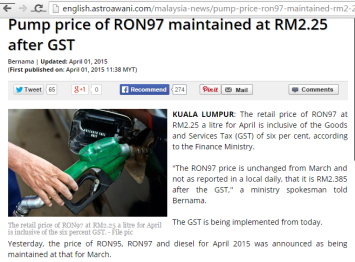 Here’s comes the question of Realism, bias and representation in the media both TV and social media. TV and radio as the channel in broadcasting industry presents a “mediated” version of reality. This is due to the factors of sociological, political, economic, financial and ideological that influenced and determined the way in which the media constructs the reality to us. Not only that the text read by TV reporter or DJs on the radio about the news are also re-packaging “reality” and presenting them in terms of “stories” which constitute a structure like an essay that has introductory part, body and closure with characters (informants or people who have authority over this GST issue) and from certain point of views that may be bias. It’s said to be bias because it’s only represent the point of views of the people who have the higher hierarchical position in the country such as politicians and policy makers rather than the people themselves who pay the tax. And because of that, people tend to criticize GST on unofficial blogs and on their social accounts without getting a clear justification on why they have to pay for those taxes and they are given no channel to voice out their disagreement over this policy except for blog sites.
Here’s comes the question of Realism, bias and representation in the media both TV and social media. TV and radio as the channel in broadcasting industry presents a “mediated” version of reality. This is due to the factors of sociological, political, economic, financial and ideological that influenced and determined the way in which the media constructs the reality to us. Not only that the text read by TV reporter or DJs on the radio about the news are also re-packaging “reality” and presenting them in terms of “stories” which constitute a structure like an essay that has introductory part, body and closure with characters (informants or people who have authority over this GST issue) and from certain point of views that may be bias. It’s said to be bias because it’s only represent the point of views of the people who have the higher hierarchical position in the country such as politicians and policy makers rather than the people themselves who pay the tax. And because of that, people tend to criticize GST on unofficial blogs and on their social accounts without getting a clear justification on why they have to pay for those taxes and they are given no channel to voice out their disagreement over this policy except for blog sites.
If we look at the News we can see that various political, social and cultural factors affect the version of “reality” representation. TV3 may well deal with local affairs but its main focus is likely to be pro-government with the advertising on how good is GST with the use of celebrities such as Nabil Raja Lawak and Pekin Ibrahim to promote it and as well the songs played during commercial break. Besides, it has one talk program with the Prime Minister regarding this GST issues broadcast for an hour.In addition, when it’s prone to support government point of views, it won’t broadcast any bad news of the government except for international TV Programs such as Al-Jazeera which once has the issue with the Deputy of Head Minister of Sarawak against corruption and timber industry. Despite of presenting international affairs, Astro Awani is also influenced by governmental power and this evident whenever there’s important announcement from the Ministers, they’d stop whichever program right away for that session. TV2 presented Multilingual news and it’s likely to be lenient by reporting three majors ethnics in West Malaysia; Malay news, Chinese news and Indian news. It’s less biases because it takes different perspectives of diverse ethnic groups. As viewers we need to bear in mind that there’s no news cooperation that could except from being bias because it’s already constructed like presenting the most important news at first in order to seek the attention of the viewers and ended up with “mood-lightening” news such as sports and recent events or programs that happened around the world (Starkey, 2006)
As we all know TV news is meant for a big mass of audience and therefore it has to be made interesting, balanced, fair and accurate to attract audience. Certain narrative conventions govern the programme as a whole and the treatment of individual within the programme. Only at the end of the news we all as the viewers know that the news presenter knew it at the very first place. However, we’re being controlled to sit there for an hour to watch what’s GST and the good of it without thinking that the News are represented in various ways, styles and method of story-telling. For instance, the news about the maintaining of the price of the fuel RON97 for April broadcast by Astro Awani is seemed partial, biased and unbalanced version of events because to the people themselves it’s a big issue once the month of April is gone and as we all already know that how our society gets anxious over the rise of fuel price and the cut of government subsidy has caused chaos not only on social media but in reality through word-of-mouth and they would stop talking about it unless the price going down again.
Most people sees tax evasion is burdening them because they have to pay extra charge of things that they no longer can buy based on their affordability. But to government, as they said it’s to boost up our economic downturn. This can be a complicating issue in audience’s mind when they watch a news item and the extent to which they processed the programme in terms of individual preferences, prejudices, outlooks and interest. It’s all depend on how our brain interpret those visual and auditory information and we might receive a little surprise when we could compare and pick different views which completely different from another views in the same programme for a better understanding of mainstream issue that is way more to conspiracies than unveil the truth.
Social Media: Unofficial Jounalist Is On The Rise
Today, there’s multi-platform of conveying news to listeners and viewers that turns broadcasting industry as highly demand career with the future prediction that internet will take over the masses. At first, broadcast media have dovetailed their own cooperation websites with radio and television. There’s a fierce competition due to hundreds of radio, TV channels and now with the emergence of Internet, journalists don’t have to be anxious if they got the wrong news because it wasn’t them who discovered it at the first place with the principle of “First is First and Second Is Nowhere and if you were wrong you’re not the first”. The Web has brought untold benefits in journalism for instance blogosphere (Lawrie & Craig, 2014) Bloggers can be diarists and for democratic purposes but it also can be prejudiced and totally untrue. This is because bloggers are owned personally and it’s hardly to trace the details of the owner because often we see bloggers have their own nick names which also known as cyber world identity. One of the reasons they chose to keep their details anonymously is because of what’s content in their writing. No one wanted to be blamed for advocating certain views plus with our political system that is likely to be half democratic that limits the freedom of speech. Hence, in order to share their views to the world, there’s only one channel which is social media. Some bloggers utilize it to criticize governments or even their workplace by posting candid comments. These anonymous bloggers are smart they started off by avoid posting comments that would give away their work location and sometimes they waits days or even weeks after an incident to write about it on the off chance the person involve might read the blog so it’s not obvious for them to get caught if they publish it right after the incident happened (Knight & Cook, 2013) Occasionally they can just talk and write about funny stories or interesting stuff that happened that day but it might not be catchy as a hot news that in the heat of the moment and can cause chaotic as people keep talking about it and bloggers wanted to leave remarkable effect on their readers as well.
Several Web sites offer suggestions on how to veil one’s identity where they don’t have to disclose about their personal details such as job location, co-workers names or any details that may link a blogger to their company’s websites. Apart from that these smart anonymous bloggers know that their Internet activity could be traced by their employers if they blog at work or using the company Internet connection plus there’s a policy of Internet usage at workplace which meant only for work and not for personal purposes. IP address and servers are unique and it can show one’s exact location. Some said “if you have nothing to hide you have nothing to fear of” basically not applicable for most bloggers who intended to criticize and have opinions which are contradicts to the mainstream views. Some bloggers even blog on how to remain anonymity position when they wanted to bring people whom they know in real life in on the secret by not communicating with their personal email address or setting password that’s related to their personal information and easy to be hacked.
References
Andrew Boyd, P. S. (2012). Broadcast Journalism: Techniques of Radio and Television News. UK: Taylor & Francis.
Beers, D. (2006). The public sphere and online, Independent Journalism. Canadian Journal of Education, 29(1), 109-130.
Horrigan, J. (2006). Online news: For many home broadband users, the Internet is a primary news source. Retrieved from http://www.pewinternet.org/2006/03/22/online-news-for-many-home-broadband-users-the-internet-is-a-primary-news-source/
Lawrie Zion, D. C. (2014). Ethics for Digital Journalists: Emerging Best Practices. US: Routledge.
Megan Knight, C. C. (2013). Social Media for Journalists: Principles and Practice. UK: SAGE.
Marcovici, M. (2013). The Wealthy Blogger: How to make money with your Blog.
Starkey, G. (2006). Balance and Bias in Journalism: Representation, Regulation and Democracy. New York: Palgrave Macmillan.
Talbot, M. (2007). Media Discourse: Representation and Interaction. Scotland: Edinburgh University Press.
Westheimer, J., & Kahne, J. (2004). What kind of citizen? The politics of educating for democracy. American Educational Research Journal, 41(2), 237-269.

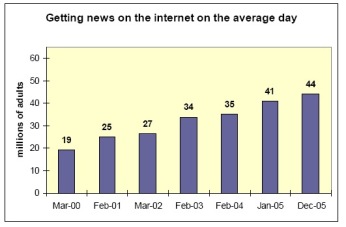
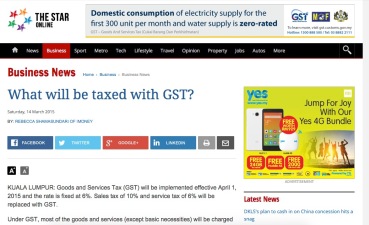

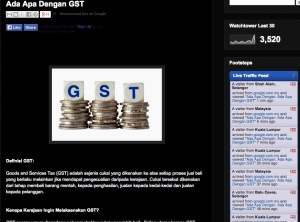
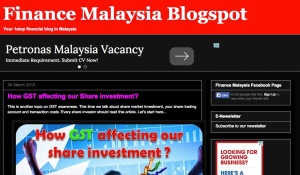
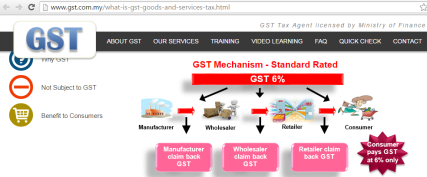
A good topic on current trend to be pondered on? Why do you think man less favors online newspaper then?
LikeLike
Thanks Celestier. In our opinion, man favors more on traditional newspaper because they can read on the sections like economic and sports in details. We don’t mean tat the online newspaper are not precise, but we perceive that the traditional newspaper are rather audience-oriented compared to the online newspaper. Thanks again for your opinion!
LikeLike
nice one guys…keep it up…
i prefer online news….bcoz its free….i cn read at toilet…class…and everywhre using my fon…..
follow and our blog 2…tq
LikeLike
nice article!
this is first time i heard about “E-zine news media”. keep up the good job 😀
LikeLike
skrg zaman teknologi, printed newspaper sdh jarang dibeli..
LikeLike